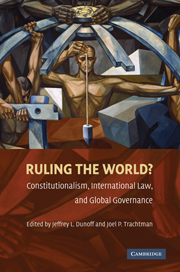Book contents
- Frontmatter
- Contents
- Contributors
- Preface: International Institutions: Why Constitutionalize?
- Acknowledgments
- PART I WHAT IS CONSTITUTIONALIZATION BEYOND THE STATE?
- 1 A Functional Approach to International Constitutionalization
- 2 The Mystery of Global Governance
- 3 The International Legal System as a Constitution
- PART II THE CONSTITUTIONAL DIMENSIONS OF SPECIFIC INTERNATIONAL REGIMES
- PART III CROSSCUTTING ISSUES
- Index
- References
1 - A Functional Approach to International Constitutionalization
Published online by Cambridge University Press: 05 June 2012
- Frontmatter
- Contents
- Contributors
- Preface: International Institutions: Why Constitutionalize?
- Acknowledgments
- PART I WHAT IS CONSTITUTIONALIZATION BEYOND THE STATE?
- 1 A Functional Approach to International Constitutionalization
- 2 The Mystery of Global Governance
- 3 The International Legal System as a Constitution
- PART II THE CONSTITUTIONAL DIMENSIONS OF SPECIFIC INTERNATIONAL REGIMES
- PART III CROSSCUTTING ISSUES
- Index
- References
Summary
The problem of international constitutionalism is the central challenge faced by international philosophers in the twenty-first century.
Introduction
This is a book about constitutional practice – and constitutional discourse – at transnational sites of governance. For some readers, this may seem an odd topic. As a historical matter, constitutional discourse has predominantly – but not exclusively – occurred in the domestic legal setting. However, as described in the essays in this volume, recent years have witnessed an intensification of constitutional discourse in many sites of transnational governance. In response, a rapidly growing body of scholarship explores the existence and implications of international constitutions. Drawing on insights from scholarship in international relations, international law, and global governance, the essays in this volume extend earlier efforts and describe, analyze, and advance international constitutional debates. To do so, these chapters examine the conceptual coherence and normative desirability of constitutional orders beyond the state and explore what is at stake in debates over global constitutionalism.
This is a particularly auspicious time to undertake such a project. As discussed below, the enhanced salience of debates over constitutional orders beyond the state reflects, in part, larger trajectories in international relations, including the increased density and reach of international norms, the increasing importance of new legal actors in international legal processes, and the rise of new topics of international legal regulation – along with an increasing sense that some of these developments threaten elements of domestic constitutional structures.
- Type
- Chapter
- Information
- Ruling the World?Constitutionalism, International Law, and Global Governance, pp. 3 - 36Publisher: Cambridge University PressPrint publication year: 2009
References
- 26
- Cited by



